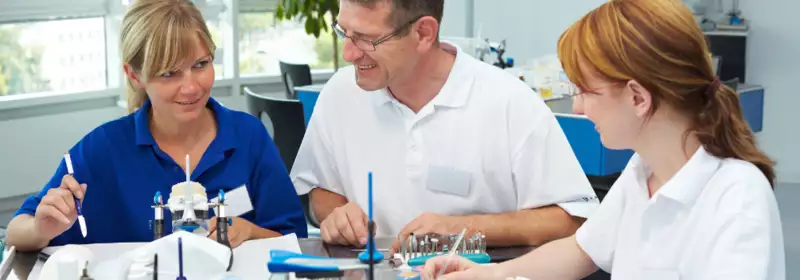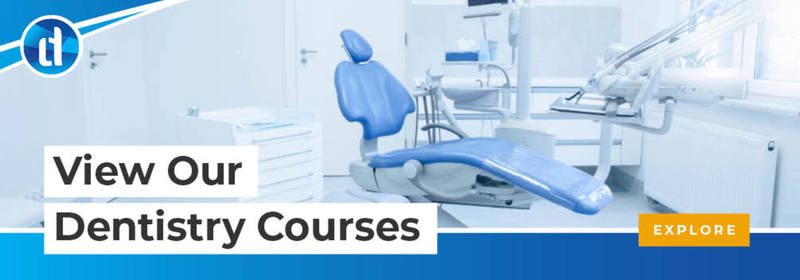A successful dental practice is one that delivers the highest quality services to improve patient well-being and satisfaction.
As such, how effectively a dental practice is managed can leave either a good or bad impression on patients. If it’s bad, this can impact retention rates and tarnish the reputation of your business.
To avoid this, your practice must reflect your commitment to your patients and practising to the highest standards. The environment and the professionalism you display as a dental team will leave a lasting impression. Patients will pick up on this the minute they walk through the door and their experience will decide whether or not they come back.
Many things make up this experience. Clinical aesthetics, the quality of treatment provided and a clean environment are just a few. While there are many factors, there is one element that determines how successful it is as a whole: the practice team.
Every member of the team directly affects the success of the dental practice. How they communicate, their attitudes and the way they deliver the patient experience all contribute to the practice image.
Effective dental teams realise the individual parts they play in working toward the common goal of a successful dental practice. Through their competence and teamworking ability, they can create a professional yet inviting environment while delivering exceptional patient care.
Each individual has the ability to make the practice more productive, cost-effective and profitable. Find out more about the qualities that make up the ideal dental practice team.

Communication
Communication is essential to successful teamwork. Through communicating with each other, dental team members can work cohesively to provide the best care for patients. The way they communicate with dental patients also sets expectations for the overall patient experience.
Without good communication skills, holes may begin to appear in the process. For instance, the front desk booking inappropriate dental appointments because they are ill-informed. It doesn’t look good to the patient, plus it eats into valuable appointment space.
Consider also that the first impressions the patient receives of a practice is typically by phone, then in a consultation. By effectively speaking and listening to the patient, the dental team member on the phone builds the expectation of a positive experience. In walking them through their options and discussing outcomes, the patient can feel confident about receiving dental treatment.
By placing value on the conversations had with patients and colleagues, the dental team can significantly impact a patient's satisfaction and the practice's success.
This responsibility extends further than those on the phone and welcoming patients. The entire dental team must hold these values since they all have different interactions with the patient.

Enthusiasm and Passion
The attitude of a dental team can make or break a practice. Unhappy, disinterested employees make for a tense, awkward environment for dental patients. It also increases the chances of mistakes and malpractice.
The dental team will have a personal drive to care for their patients and be enthusiastic about their work. However, it’s not enough to rely on this alone.
Effective leadership is at the heart of most – if not all – successful businesses. A clear vision of why the business exists and what it strives to achieve serves as a guide to all team members. It sets the standards and the ethics that everyone is expected to work to.
Which is why a dental practice focused on making money will breed a culture of overcharging and profit over patients.
Therefore, a dental practice driven by a desire to help others and deliver the best possible care will encourage that behaviour.
Linked to this is the value of investing in the dental team. A dental practice that encourages development through dental CPD courses and similar will see the value their team provides to the patients increase.
The confidence, high morale and positivity displayed by dental teams who are valued and trusted, create feelings of trust in their patients.

Bedside Manner
Many people have a fear of the dentist. This is due to its typical association with pain and invasive treatments. Even those that aren’t scared of it, aren’t exactly fond of it.
Therefore, a good bedside manner is essential to be a successful dental professional. People may forget what you say and do, but they never forget how you make them feel.
While the focus is on their health needs, pastoral care is an important part of the role. If a patient needs a gentle approach and your demeanour reads otherwise, they likely won’t come back for another visit.
Also, Informed Consent is an essential part of patient care and treatment. Aside from it being a legal requirement, explaining the dental patient’s options helps them to feel in control. They have the right to choose what is best for them, even if that means ‘do nothing at all’.
By explaining what each of the dental treatments involves, their outcomes and possible complications, the patient can feel more at ease.
The advantage of this is it helps to build trust between your dental team and your patients as they feel included in the process and listened to.
Through these discussions, you may find that a patient suffers from anxiety or can find dental treatments distressing. You can adjust your approach to dental treatments accordingly, by giving them breaks during the treatment. Or agreeing on a hand signal they can give if they are feeling overwhelmed and need to stop.
No matter how challenging, it falls to you and your dental team to help them through their appointment or treatment.

Skills and Knowledge
As dental procedures and technologies evolve, so do the other aspects of the industry. A dental team is only good if they are competent and confident in their role. Therefore, proactive steps are required to ensure the dental teams grow along with the industry.
The best way to ensure this is to train and educate dental staff on an ongoing basis. This teaches them the latest technologies, procedures and innovations while reinforcing the values of the dental profession.
Dentists, hygienists, dental nurses and dental nursing assistants are required to take continuing professional development courses to stay licensed. As dentistry is only one part of what takes place in a dental practice, training the wider team is also extremely important.
This ensures all team members are on the same page. Any bad habits picked up in previous work environments can be ironed out. Plus, it demonstrates the value of the whole team in the dental practice.
No matter if a team member is brand new or they’ve been there for over thirty years, training is an excellent way to bring everyone up to the same level of performance. A well-trained and efficient dental team can save you time, increase productivity and improve your practice’s quality of care.

Ultimately, each team member is involved in creating an exceptional experience for the dental patient. If you are looking to improve your skills with continuing education, there are many online options available.
learndirect is the leading UK distance learning provider. From Learning the Essentials of Communication to Clinical Photography and Periodontal Therapy, we have CPD courses to suit.
Should you be looking to enter the dental profession, we also have online dentistry qualifications in Dental Nursing and Dental Practice Administration.
All these courses are provided online, so they allow you the freedom to study around current work and family commitments.
To find out more click the link below to view all the dentistry online training courses we have available.



















